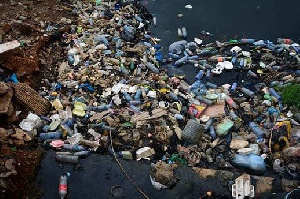 There is an opportunity to convert waste into jobs and money
There is an opportunity to convert waste into jobs and money
Several possible causes to the dying water bodies in Ghana were raised in my previous article” Reviving the Dying Water bodies in the Light of Rising Pollution Levels and Population Growth”.
Among the list were (1) dumping of refuse into water bodies as a common practice in some areas, as well as, having refuse dumping grounds located close to water bodies; which leads to conscious and unconscious dumping of waste into such water bodies, and (2) heavy defecation along water bodies being a norm in many areas and many others.
Unfortunately, these pollution practices have been normalized in several Ghanaian communities for ages, and have become a part of the societal fabric or way of life. Changing these habits would, therefore, require sustained education, as well as, provision of alternatives in the form of new ideas, facilities and processes.
It is my strong view that these issues would not be resolved by abruptly passing new laws for people to desist from such acts without providing alternatives and time for the communities to change their habits. Note that, a fact of life is that, most people do not like change. Especially, changes to their way of life. Over time, however, with a well thought-out strategy and proper implementation, these communities could transform slowly to environmentally friendly spaces.
Therefore, it is important to propose and implement attractive, sustainable and perhaps lucrative environmentally friendly alternatives for the communities to test out themselves while the government and others serve as a catalyst for change. This means, the government, as well as other stakeholders, need to work together with communities to identify and understand the underlying factors as they work towards some sustainable common ground.
On this issue of pollution, some of the known major reasons for water body pollution in Ghana are the non-existence of waste management systems to deal with the enormous generated waste on regular basis. Also, the lack of a functional public sewer system for homes and even public toilets to connect with are non-existent. Existing public toilets which the majority of Ghanaian rely on are not well maintained and unsanitary. Most of these public toilets charge exorbitant fees to use, yet house outdated and non-functioning toilets that run on outmoded technologies.
Since the communities and the government both want a win-win situation, the following are some suggestions to achieve that. In today’s economy, waste, including refuse and faeces is regarded as a valuable asset with industry prospects running into the multi millions if not billions of dollars. Simply put, this means there is an opportunity to convert waste into jobs and money. This spans from recycling to energy production to mention a few of the direct prospects. It will also involve waste transportation and separation and much more, as part of the process to collect and utilize waste as a raw material.
Given the current situation and needs, pursuing energy production from waste seems to be an attractive option. Energy production could be achieved by either directly burning waste and/or producing biogas from the organic part of the waste such as the food material and faeces to generate electricity. The byproduct from producing biogas is the organic fertilizer that can be used in the agriculture industry.
For the sustainability of the energy production process, it must be tied to constant supply of waste. This could easily be achieved if several communities could have their waste fed into a central waste processing plant to ensure constant energy production. In turn, communities could benefit from reduced electricity tariffs while the government or investor (s) makes gains on its investment. While pursuing these ideas, individuals within the communities, especially children should be sensitized to become champions of the environment.
To effectively pursue these ideas, we must also think out of the box when it comes to the design of public sewerage infrastructure. A well-designed inter-connected system whereby homes that have installed toilet facilities feed into a central sewer collection site for access to the raw material would be beneficial. If the public toilets are also connected to this system, usage could be free since it is the waste that becomes the money earner not the fees at the gates that usually go unaccounted for.
While all these things are being done, simple things like rubbish dumpster could be positioned at vantage locations to assist waste collection at source to prevent the use of existing polluting dumping grounds.
The above ideas will not only payback on investment while preventing pollution; it would lead to increased cleanliness, improved sanitation, lowering of the potential spread of infectious diseases, cost-saving associated with current sanitation responses as well as create good jobs for the many unemployed youths.
In my view, thinking along these lines would make all stakeholders winners.